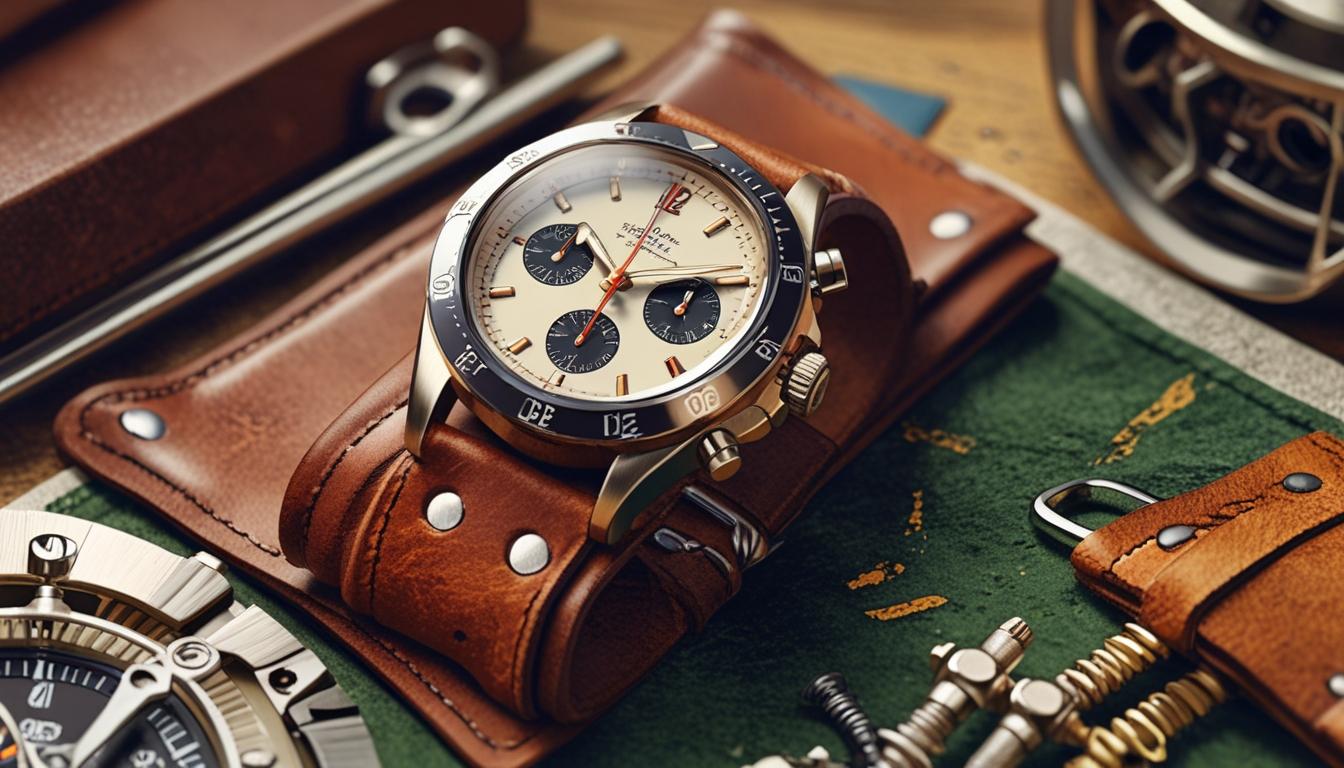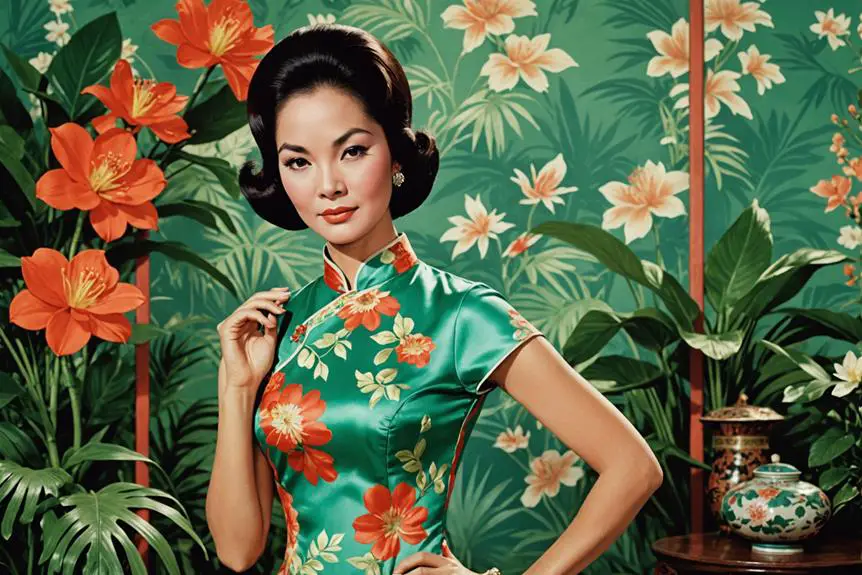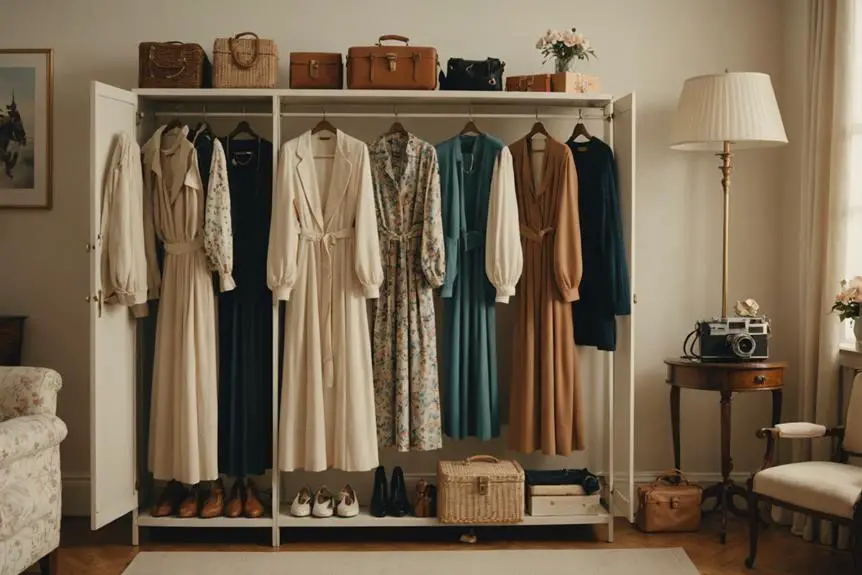Kenzo began its journey in 1970 when Kenzo Takada opened his first boutique, Jungle Jap, in Paris, celebrating his Japanese heritage. By 1976, the brand's name transformed to Kenzo, merging traditional aesthetics with contemporary style. Over the years, leadership changes kept the brand fresh and relevant, notably under Nigo, who shifted its focus towards streetwear. Known for bold prints and the iconic Tiger Logo, Kenzo emphasizes individuality and diversity. As it expands globally, the brand remains committed to sustainability and innovation. Kenzo's artistic vision continues to shape fashion trends and cultural narratives today, making it a significant player in the global fashion landscape.
Founding of Kenzo
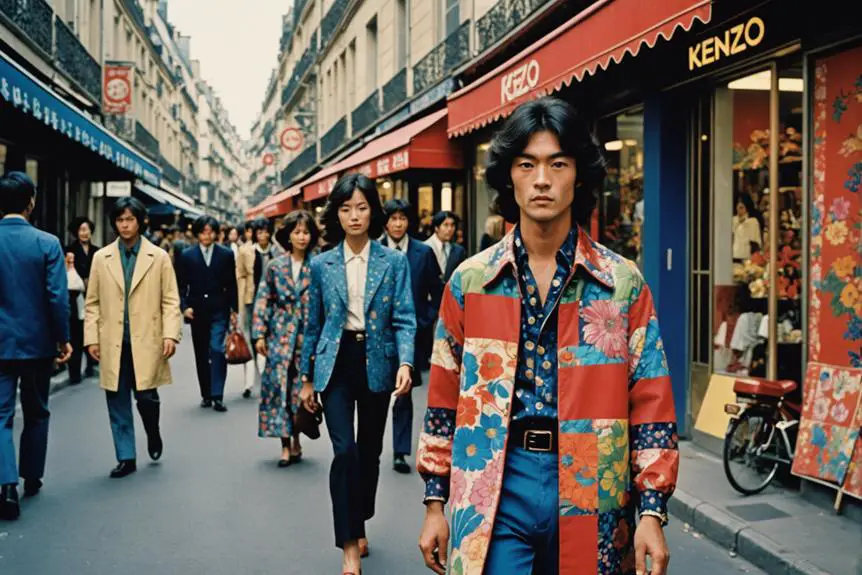
The founding of Kenzo marks a pivotal moment in the world of fashion, rooted in a blend of cultural narratives and innovative design. In 1970, Kenzo Takada established his first boutique, Jungle Jap, in Paris, a name that reflected his Japanese heritage while embracing a playful, eclectic spirit. This initial venture set the stage for the evolution of a brand that would soon gain international acclaim. Kenzo's unique approach was characterized by a harmonious fusion of Japanese and Western aesthetics, which captivated fashion enthusiasts and influenced trends worldwide. By 1976, following a successful New York fashion show, the brand shifted to simply Kenzo, as the original name began to evoke unintended negative connotations.
Kenzo Takada's early collections were distinguished by vibrant colors and floral patterns, which showcased not only his Japanese roots but also a celebration of cultural diversity. These unique designs captivated a global audience, allowing the brand to expand into menswear and accessories by the late 1980s. Kenzo quickly became synonymous with a fresh approach to fashion, merging traditional aesthetics with contemporary flair. Takada's retirement in 1999 marked a significant chapter in Kenzo's history, as the brand had already cemented its legacy in the fashion world, paving the way for future innovations.
Evolution of Leadership
As Kenzo Takada stepped down in 1999, the brand faced a pivotal change in leadership that would shape its future direction. The shift from Takada's visionary approach to a new era of creative directors marked a significant evolution for the Kenzo brand. Initially, Roy Krejberg and Gilles Rosier took the helm, preserving Takada's vision until Antonio Marras led from 2008 to 2011, bringing a fresh perspective.
The turning point came when Humberto Leon and Carol Lim joined in 2012. Their collaboration revitalized Kenzo, blending contemporary trends with the brand's rich heritage, which resonated with a younger audience. In 2020, Felipe Oliveira Baptista introduced vivid colors and clean silhouettes, but his tenure was short-lived.
Most recently, Nigo's appointment as artistic director in September 2021 signaled a pivot to streetwear influences, further diversifying the brand's identity. This ongoing evolution of leadership illustrates how Kenzo adapts to cultural shifts, ensuring relevance in a competitive fashion landscape.
| Creative Director | Years |
|---|---|
| Kenzo Takada | 1970-1999 |
| Roy Krejberg & Gilles Rosier | 1999-2008 |
| Antonio Marras | 2008-2011 |
| Humberto Leon & Carol Lim | 2012-2019 |
| Felipe Oliveira Baptista | 2020-2021 |
| Nigo | 2021-Present |
Global Headquarters

Located at 18 rue Vivienne in the heart of Paris, Kenzo's global headquarters stands as a symbol of the brand's rich history and creative spirit. The building, constructed in 1640 by architect Pierre Le Muet, carries significant historical value, connecting the brand to the very essence of Parisian architecture and culture. This location serves not only as a workspace but as a central hub for the studio, workshop, and various support functions, embodying Kenzo's commitment to creativity and innovation in fashion.
Strategically positioned in one of the world's foremost fashion capitals, Kenzo's headquarters enhances its presence in the competitive luxury market. This Parisian enclave allows the brand to draw inspiration from its surroundings, fostering an environment where creativity flourishes. The blend of historical significance and modern functionality within the headquarters reflects Kenzo's rich heritage, making it an essential part of the brand's identity.
As you explore this iconic site, you can appreciate how its architecture and atmosphere contribute to Kenzo's narrative, bridging the past with the present while continuing to inspire future generations of fashion enthusiasts.
Brand Identity and Aesthetics
Celebrated for its vibrant prints and daring color combinations, Kenzo has crafted a distinctive brand identity that seamlessly merges Japanese aesthetics with Parisian flair. The brand became a beacon of cultural diversity, showcasing bold designs that reflect a fusion of nature and artistic expression. Central to this identity is the iconic Tiger Logo, a motif that embodies the adventurous spirit and eclecticism synonymous with Kenzo.
Under the creative direction of Nigo since 2021, the brand has embraced contemporary streetwear styles while staying true to its roots in vibrant aesthetics. Kenzo's collections often feature oversized silhouettes and layering techniques, promoting a sense of comfort and casual luxury that resonates with modern consumers. The brand's ethos revolves around optimism and creativity, aiming to harmonize various cultural influences through innovative designs.
In the domain of Paris Fashion, Kenzo stands out for its ability to blend tradition with modernity, making a statement that is both timeless and progressive. This unique approach allows the brand to appeal to a diverse audience, celebrating individuality and self-expression in every piece. Kenzo truly embodies a celebration of life, culture, and fashion.
Notable Collections and Collaborations
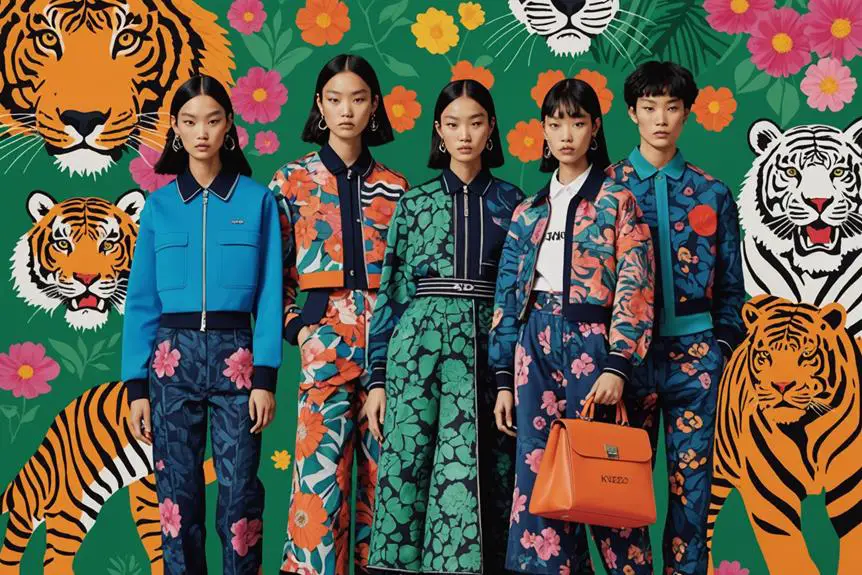
Kenzo's vibrant identity naturally extends into its notable collections and collaborations, which epitomize the brand's innovative spirit and commitment to cultural fusion. One of its first major hits, the Kenzo Tiger Sweater, launched in 2012, quickly became a fashion staple, selling out in just two days. This iconic piece exemplifies how Kenzo successfully blends bold graphics with wearable fashion.
In 2016, Kenzo collaborated with H&M for a highly anticipated collection, generating significant buzz and drawing large crowds. This partnership showcased the brand's ability to reach a wider audience while maintaining its unique aesthetic. In 2018, pop icon Britney Spears starred in the La Collection Memento No. 2 campaign, celebrated through the #KenzoLovesBritney initiative, highlighting nostalgic denim pieces that resonate with both celebrities and fashion enthusiasts.
Kenzo also collaborates with high-profile photographers like David LaChapelle, merging traditional and contemporary styles in striking visuals. Regular releases of special editions and capsule collections keep the brand relevant and appealing, ensuring that Kenzo not only follows trends but also sets them, continually enriching its cultural narrative in the fashion world.
Retail Expansion and Presence
With nearly 145 stores worldwide, Kenzo has strategically expanded its retail presence to include flagship locations in key markets such as the U.S., Southeast Asia, and Europe. In the U.S., you'll find flagship stores in prominent areas like Wynn Las Vegas and SoHo, Manhattan. After closing flagship locations in Los Angeles and New York in the early 2000s, Kenzo reestablished its presence in SoHo in June 2020, signaling a commitment to revitalizing its market influence.
Southeast Asia and Japan remain critical for Kenzo's retail expansion, as the brand has tailored its boutique designs to resonate with local consumers while maintaining its unique aesthetic. This focus is exemplified by their joint venture in 2019 aimed at regaining control of 35 stores in China, showcasing Kenzo's desire to solidify its market presence in Asia.
Moreover, Kenzo recognizes the importance of adapting to the digital landscape. The enhancement of its online retail platform, Kenzo.com, allows the brand to connect with modern consumers, blending traditional boutique designs with the convenience of e-commerce. This dual approach guarantees that Kenzo remains relevant in an ever-evolving retail environment.
Marketing Strategies and Ambassadors
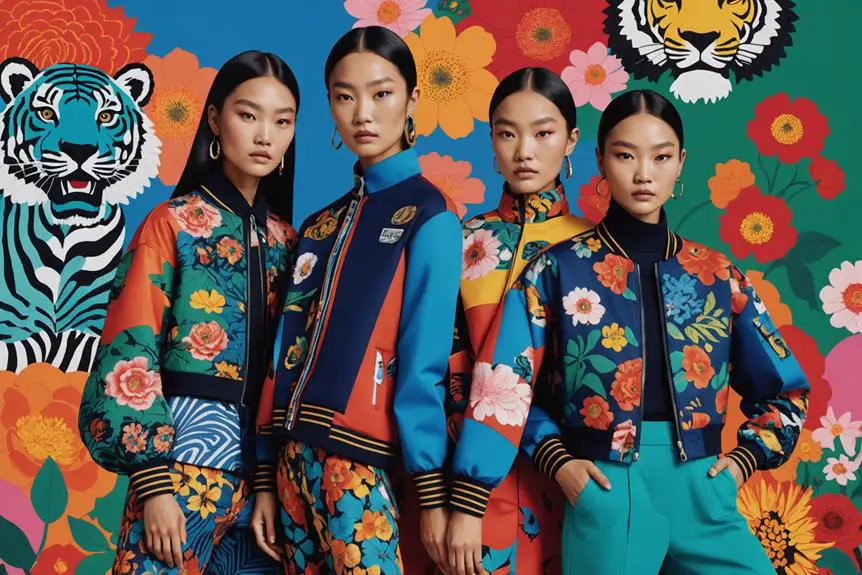
In 2023, Kenzo took a bold step by appointing SEVENTEEN's Vernon as its first global brand ambassador, a strategic move aimed at engaging younger audiences and enhancing the brand's contemporary appeal. This choice reflects Kenzo's innovative marketing strategies that focus on cultivating a connection with the youth culture. By leveraging celebrities like Vernon, Kenzo enhances not only its visibility but also its relevance in a fast-paced market.
The brand's campaigns often spotlight iconic Paris locations, weaving a narrative that resonates with its cultural roots while appealing to a global audience. Collaborations with stars, such as Britney Spears in the #KenzoLovesBritney campaign, capitalize on nostalgia, ensuring that the brand remains top-of-mind among diverse consumers.
High-profile photographers are frequently engaged to deliver striking visuals for spring campaigns, blending traditional aesthetics with modern flair. This approach not only showcases the brand's history but also aligns with contemporary trends, making Kenzo a fascinating choice for fashion-forward individuals. With these tactics, Kenzo continues to solidify its position in the fashion industry, balancing heritage with innovation to attract a dynamic consumer base.
Cultural Impact and Recognition
The cultural impact of Kenzo is marked by its commitment to promoting diversity and innovation in the fashion landscape. Under the creative direction of Humberto Leon and Carol Lim, the brand has become synonymous with cultural diversity, celebrating a vibrant aesthetic that resonates with a global audience. The iconic tiger motif exemplifies this approach, transforming into a widely recognized symbol within popular culture and influencing contemporary streetwear trends.
Kenzo's designs embody fashion that celebrates nature, blending artistic expression with sustainability initiatives. The brand's dedication to ethical fashion aligns with global movements, further enhancing its recognition in the industry. By actively supporting charitable causes, including women's rights and education, Kenzo has established itself as more than just a clothing label; it's a movement.
The brand's allure extends beyond its garments, attracting a loyal celebrity following. Icons like Rihanna, Beyoncé, and Michelle Obama frequently don Kenzo's creations, amplifying its cultural significance. Additionally, Kenzo's work has been featured in numerous fashion exhibitions, solidifying its status in modern fashion history. Through these efforts, Kenzo continues to inspire and challenge the norms of the fashion industry, leaving an indelible mark on cultural expression.
Future Directions and Vision
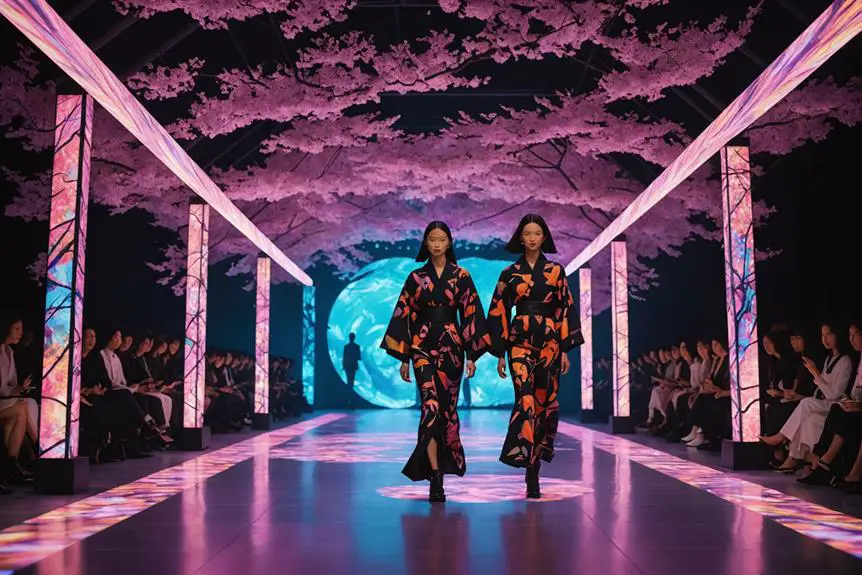
Kenzo's future is poised for exciting transformation, driven by a strategic blend of innovation and commitment to sustainability. Under CEO Sylvain Blanc's leadership, Kenzo aims to enhance its global market presence while integrating ethical practices into its fashion ethos. With Nigo at the helm as Artistic Director, you can expect contemporary streetwear styles that resonate deeply with younger audiences, reflecting a creative spirit that pays homage to the brand's roots.
Kenzo is dedicated to promoting cultural diversity through its designs, ensuring that every collection celebrates the rich tapestry of global influences. This commitment extends into nature-inspired motifs, which will continue to play an essential role in their future offerings. The brand's focus on sustainability will be evident in every aspect, from sourcing materials to production methods.
Moreover, Kenzo's investment in digital marketing strategies will engage younger consumers effectively, strengthening its online presence through platforms like Kenzo.com. Regular releases of special editions and collaborations will keep the brand relevant, catering to evolving fashion trends and consumer preferences, ensuring that Kenzo remains a dynamic player in the international fashion landscape.
Frequently Asked Questions
What Is the Story of Kenzo?
Kenzo's story reflects a unique blend of cultural influences and bold creativity. You'll discover vibrant designs and innovative styles that have continuously evolved, resonating with diverse audiences while shaping contemporary fashion trends around the globe.
Is Kenzo a High-End Brand?
Yes, Kenzo's a high-end brand, known for its vibrant designs and premium pricing. Its innovative styles, like the iconic tiger motif, attract fashion enthusiasts and celebrities, reinforcing its position in the luxury market.
What Does the Kenzo Logo Mean?
The Kenzo logo embodies a bold identity with its capital letters, while the iconic tiger reflects playful aesthetics. Initially incorporating floral elements, it symbolizes nature and cultural diversity, modernizing the brand's image while honoring its roots.
Is Kenzo Owned by Louis Vuitton?
Yes, Kenzo's owned by LVMH, which includes Louis Vuitton in its luxury portfolio. This acquisition enhances Kenzo's creativity and market presence, allowing it to thrive in the competitive fashion industry while maintaining its unique identity.


